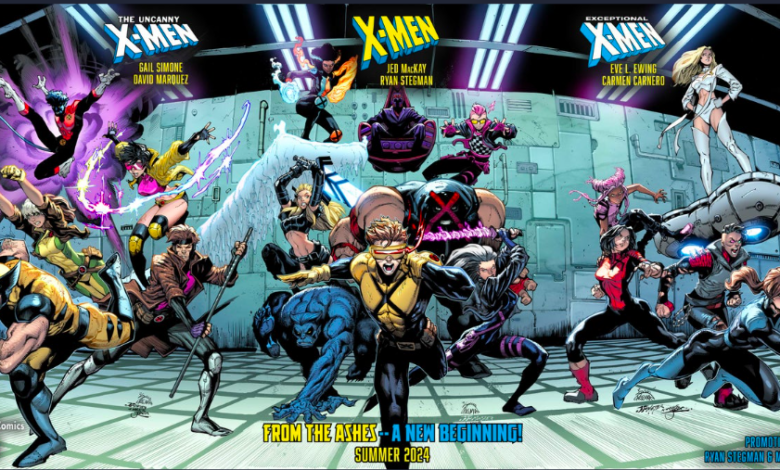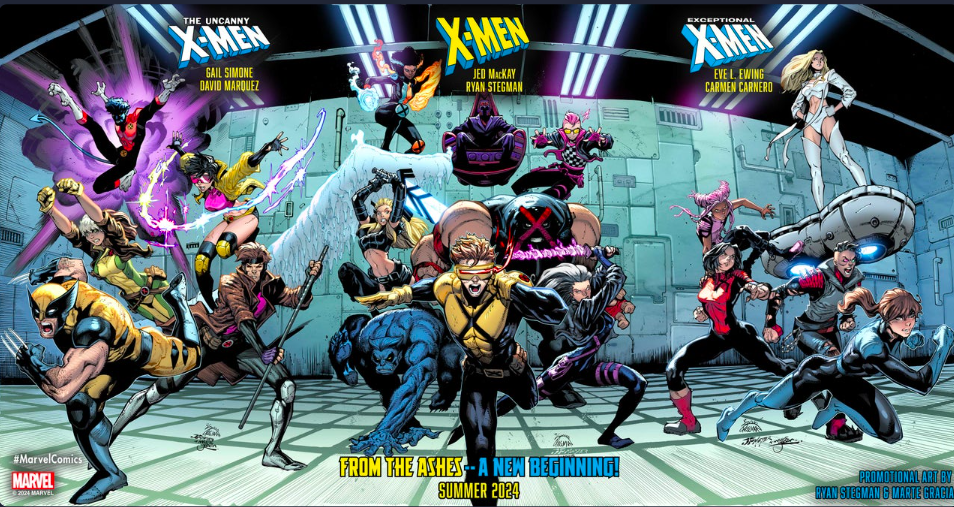Opinion: Marvel Might Have Just Ruined the X-Men Again

Joe Meola ‘25 / Emertainment Monthly Staff Writer

Marvel is in the process of wrapping up the most inventive era of X-Men comics in decades. Starting in 2019 with the comic series House of X and Powers of X, all of Marvel’s main-line X-Men comic books centered around the newly-established nation of Krakoa, a paradise for all mutants, those born with an X-gene. The five years of stories that followed brought a new level of political intrigue and high sci-fi to the X-Men books. All good things must come to an end, though, as this utopian mutant society is ending its reign in the current “Fall of X” event. This, however, is not the end of the X-Men, as the publisher has announced the new direction in which they are taking the characters.
On March 14, at the “Future of Marvel Comics” Panel at South by Southwest (SXSW), Marvel announced its upcoming “From the Ashes” line of X-Men titles, set to begin publication in July. Names and creative teams were announced for three flagship titles, with the promise of more news to come in the near future. The first of these series is X-Men by Jed MacKay with art by Ryan Stegman, focusing on a team led by Cyclops operating in Alaska. The next series is Uncanny X-Men by Gail Simmone and drawn by David Marquez, featuring a team led by Rogue in New Orleans. Last is Exceptional X-Men by Eve L. Ewing and illustrated by Carmen Carnero, centered around a team of young mutants mentored by Kate Pryde and Emma Frost in Chicago.
This news is incredibly bittersweet. While these series have some incredible creative talent behind them, they signify the end of a beloved and truly unique era in favor of a status quo that readers have seen countless times before: Mutants are being persecuted and the X-Men are fighting to stop it. Krakoa breathed new life into X-Men comics while still maintaining high stakes and engaging conflict. This regression in status quo is a clear attempt to maintain a sense of familiarity for more casual audiences just in time for the debut of the X-Men ‘97 animated series, a continuation of the beloved cartoon that ran from 1992 to 1997.
Marvel is no stranger to overhauling its comics to reflect an upcoming movie or show, but this ultimately does not help comic sales in the long run. If fans want something like the show they’re watching, they can watch that show! Even better, fast track the next season of that show! Comic book readers are tired of what is meant to be wholly original source material being used as a means of cross-promotion rather than distinct, standalone content. The X-Men are no stranger to this kind of treatment, but it definitely stings that it’s happening again.
While thematically the fall of Krakoa does make sense for the X-Men—this is a team plagued by constant tragedy, after all—it seems like such a waste to discard the concept entirely. The nation should still exist in a smaller capacity, perhaps hanging on by a thread with a new group of mutant leaders struggling to keep everything from falling apart completely. Mutantdom could still be scattered throughout the globe—as Krakoa is not as powerful as it used to be—but that slice of paradise could still be an attainable goal. We can still have series that harken back to the traditional status quo of the X-Men fighting for mutants in America and across the world without sacrificing the entire concept of the mutant nation of Krakoa. In fact, if Marvel wants to have three separate X-Men titles, one can focus on life in Krakoa and the politics surrounding that, another can focus on a team defending mutants in the United States, and the third can be a globe-trotting adventure or even set in outer space, since the X-Men always seem to get caught up in interstellar escapades. The status quo can be changed without completely abandoning what came before.
Only time will tell how this upcoming line of X-books will fare. They could end up being really good! In the meantime, fans will be mourning the loss of Krakoa.